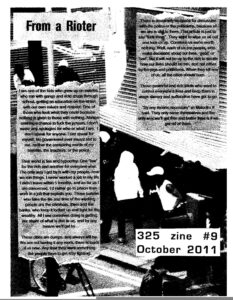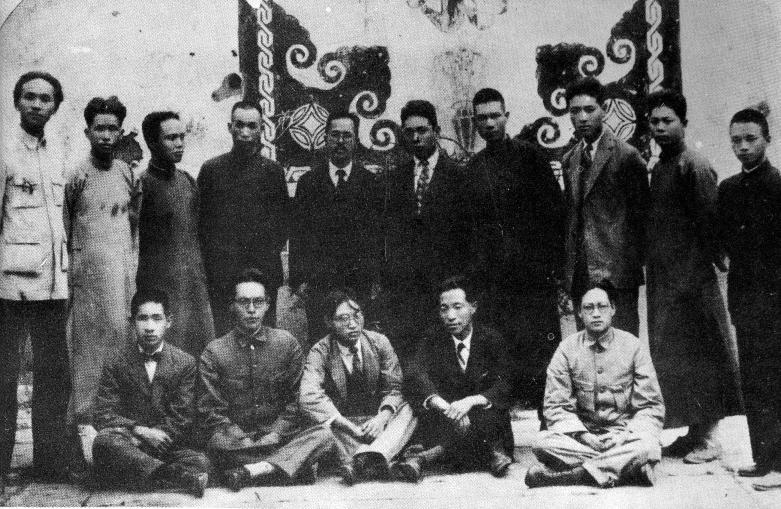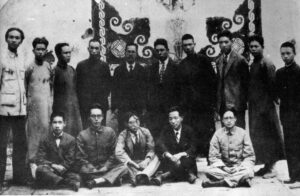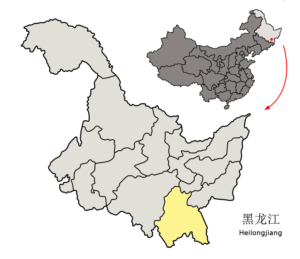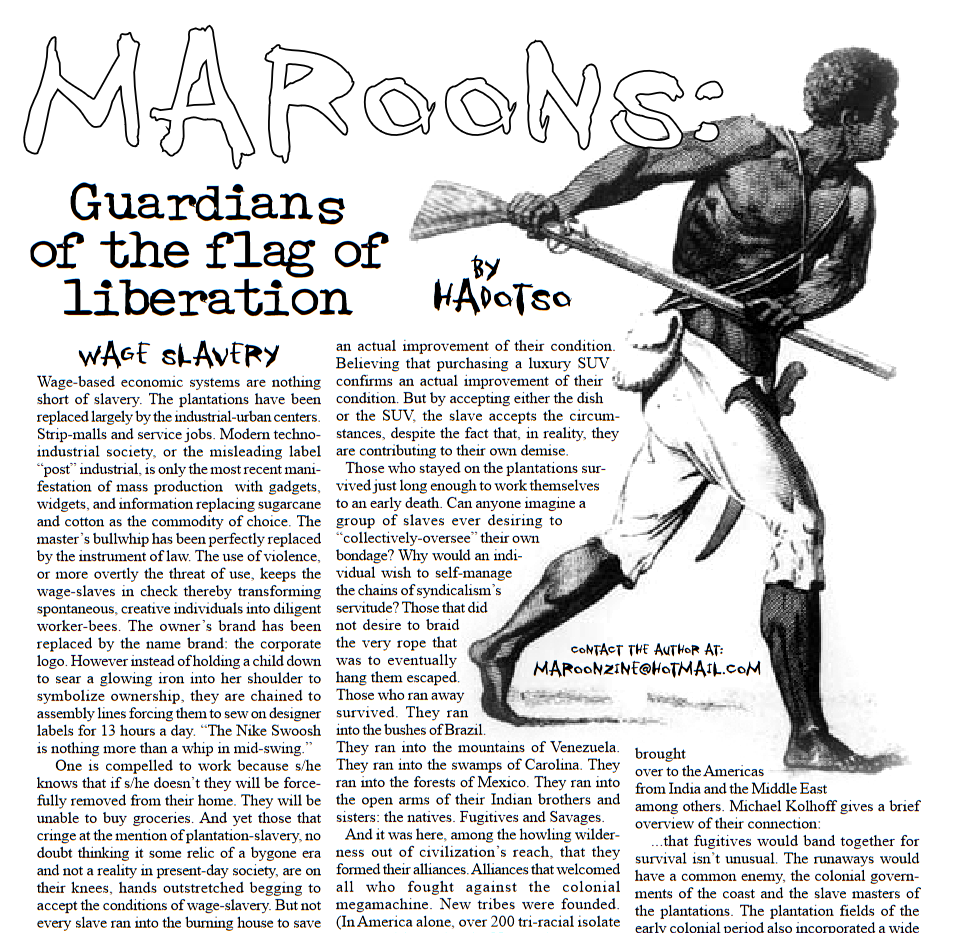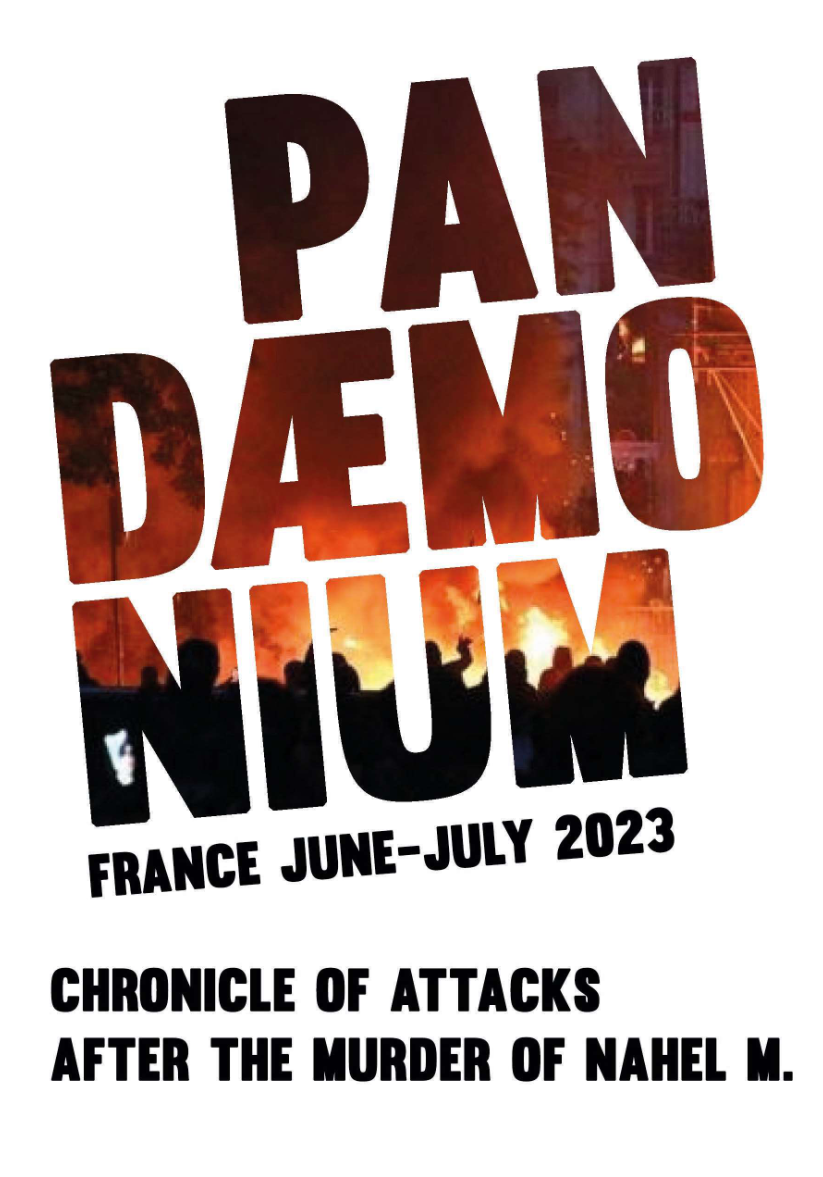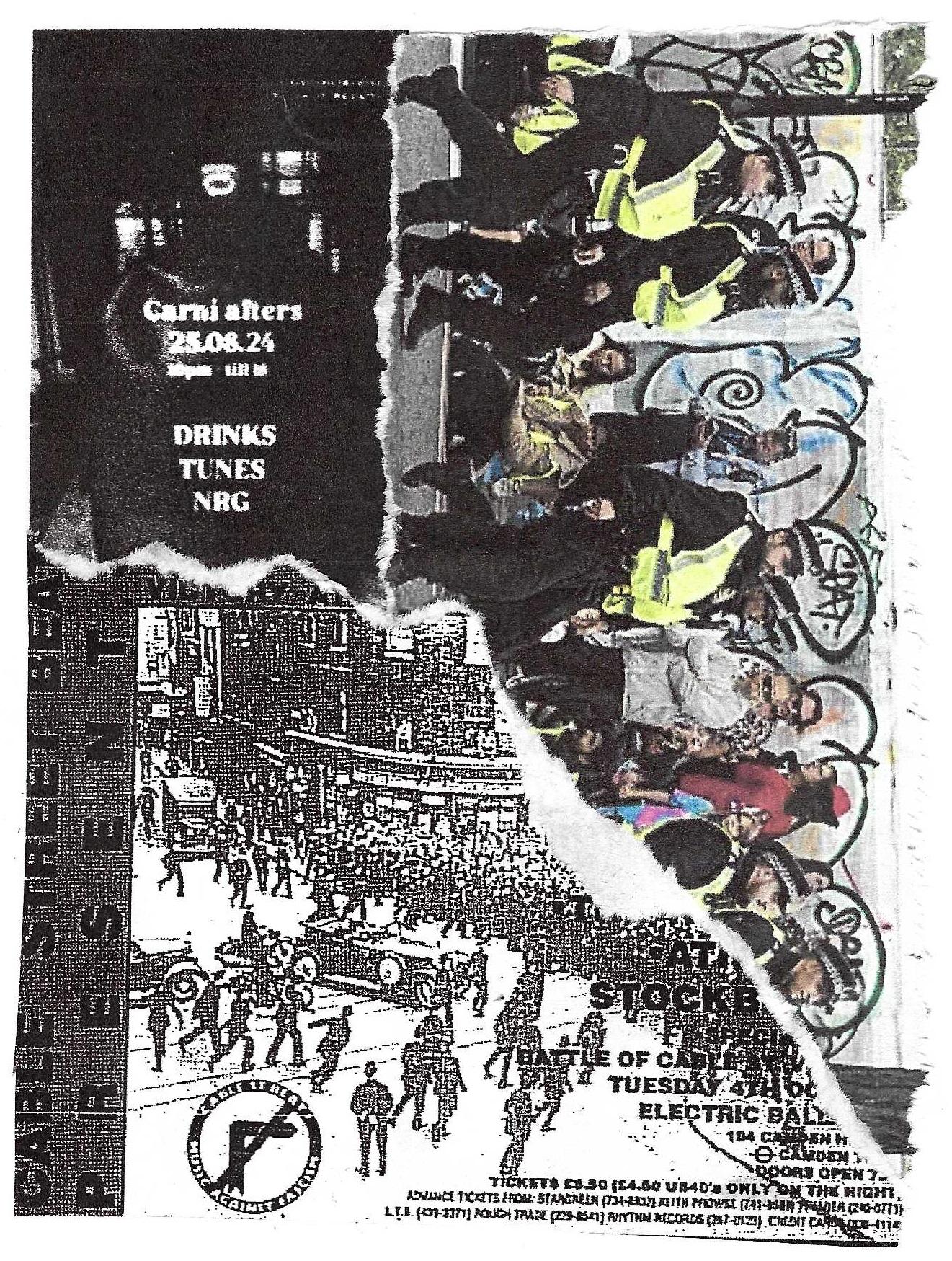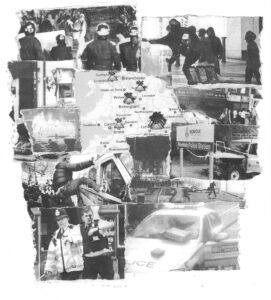
PDF FOR PRINTING AUGUST 2011 Deco-booklet SCREEN READING PDF AUGUST 2011 Deco
“Books don’t make revolutionaries. I contend that the Black people who burned down Watts and Detroit don’t have to read. These cats have lived more than the intellectual has read. So they are political by having learned from their existence. Oppression made these cats political.” – Jamil Abdullah Al-Amin
This chronology of the riots that followed the police murder of Mark Duggan, a Black man living in London, was first produced by a French anarchist publication ravage editions and later translated by English insurrectionary anarchist project Dark Nights.
ravageeditions.noblogs.org // darknights.noblogs.org
Before August.
In the months before august, small groups of masked rioters caused extensive damage in central London during the protests against budget cuts. During the November 10 (2010) demonstration against education fees an active minority of anarchists and other combative marchers moved in to attack the Conservative Party Headquarters, and many from the formerly passive march occupied and trashed the Milbank building in scenes of joyous destruction broadcast around Britain. From this point on demonstrations in London (such as the ones on November 25 and December 9) got markedly wilder and more riotous and drew in youth from London’s ghettos whose boiling rage was a sign of things to come. Again, on the March 26 (2011) trade union demonstration a large and fast-moving ‘Black Bloc’ roamed around the posh West End, attacking and outmanoeuvring police, smashing and paintbombing banks, shops, a car showroom and luxury hotels including the Ritz Hotel in Piccadilly. In July (2011) the City of Westminster police’s “counter terrorist focus desk” called for businesses and members of the public to take part in anti- anarchist repression stating: “Anarchism is a political philosophy which considers the state undesirable, unnecessary, and harmful, and instead promotes a stateless society, or anarchy. Any information relating to anarchists should be reported to your local police.”
How much the scenes of carnage in London contributed to the August insurrection can only be guessed at.
Thursday, August 4.
29-year old Mark Duggan is executed by armed police in Tottenham, London. Police then tamper with evidence, including planting a gun on their victim, shooting a police radio to suggest their victim had fired on police, and moving the vehicle from which they dragged their target. Police then boast of their killing of the Broadwater Farm estate resident in the media.
Saturday, August 6.
– In the afternoon, around a hundred residents of Broadwater Farm march to and demonstrate outside of Tottenham police station calling for “justice” for Mark Duggan
– 20:00 BST, a 16-year-old girl approached them and may have thrown a leaflet or a stone. Police swarmed the girl with shields and batons, causing head injuries. At about 20:20 BST, members of the waiting crowd attacked two nearby police cars, setting them on fire.
– A double-decker bus and several vehicles are burned, shops looted, smashed ATMs, and many shops are devastated by fire.
– A BBC vehicle is targeted.
– A photographer from the Mail on Sunday is beaten and several teams of journalists have to escape the Violence.
– The cops are attacked with stones and petrol bombs – 26 are injured and 8 are hospitalised that night.
– 71 people are arrested.
Sunday, August 7.
Around 3 am, hundreds of people loot the shopping centre in Tottenham Hale, located less than 1km from the epicentre of the riots which began a few hours earlier.
– Fire-fighters are called to 49 arsons between Saturday night and Sunday in this area. In mid-morning the police still face a mob.
– Members of the family of Mark Duggan call for calm but seemingly go unheard.
– In the early evening, incidents break out in other parts of London, including Brixton (where 3 policemen are injured), Waltham Forest, Walthamstow, Islington, Ponders End, Chingford Mount, Oxford Circus (in downtown) and Dalston and Enfield (north), where shops are vandalized and looted, and a police car is destroyed.
– 9 policemen are injured, including 3 hit by a car.
– In Brixton a large sporting goods store is destroyed by fire and looters rob another store. The windows of McDonald’s and KFC restaurants are smashed and graffitied.
– In Waltham Cross, Hertfordshire, rioters attack 2 police cars and 2 jewellers in Waltham Cross High Street at around 21:50. A specialist public order unit is sent to the area, along with sections of the
Bedfordshire and Hertfordshire Police Dog Unit.
– In Morlanwelz, Belgium, two luxury cars are set on fire and politicians and the media say the arsons were inspired by the riots in England.
Monday, August 8
– In the late afternoon, the riots have spread throughout the capital, including Hackney (near the site of the Olympic Games of 2012), as well as Notting Hill and Clapham and Peckham (south), Lewisham, Camden, Newham, Bethnal Green, East Dulwich, Croydon (where a Sky News satellite truck is attacked, and several journalists are beaten), Woolwich, Ealing and the periphery (where police vehicles are destroyed, and a supermarket is burned down), and other cities. Many shops and vehicles are looted and burned, and several underground stations are closed in London.
– In Bristol some 150 rioters attack shops.
– There is rioting in Leeds and Liverpool and arson attacks in Luton and Oxfordshire.
– In Nottingham a police station is attacked by rioters and a barricade of car tyres is ignited in the St Ann’s area
– In Medway rioters burn cars and confront the police in Gillingham and Chatham.
– In the posh neighbourhood of Notting Hill, London, a luxury two Michelin-starred restaurant and its customers are attacked. A horrified wealthy tourist later reported:
“Around the fourth dish of the tasting course, there were loud bangs outside. The restaurant staff was yelling at us to get away from the windows. Before I knew it, the front door, a solid piece of glass shattered and people came crashing in with hoodies, masks, and random weapons.” The rioters relieve the rich bastards of cash, jewellery and mobile phones.
– A restaurant in Birmingham belonging to Jamie Oliver, media chef, was also ransacked.
– Downing Street announces that David Cameron is cutting short his vacation in Italy and returning to London in a military plane.
– The Mayor of London, Boris Johnson, announces that he will also cut short his vacation and return as soon as possible.
– 6000 extra cops are deployed in London.
– RIM, the manufacturer of BlackBerry phones, announces that they will fully cooperate with British police if anything is asked of them.
– 334 people have been arrested since the beginning of the riots.
– In Denver, Colorado, USA, a cop car is smashed and the action is claimed in solidarity with the riots in England.
Tuesday, August 9.
– In the early hours, a massive Sony media corporation warehouse in Enfield is looted and torched.
– “It was like a war zone. It was total anarchy” according to a resident of Ealing (a green residential area of West London) commenting on the events of the day. A rioter in Hackney says: “It’s us versus them, the police, the system. They call it looting and criminality. It’s not that. There’s a real hatred against the system.”
– Early in the morning, a riot van is set on fire at a police station in Bristol. The action was claimed by anarchists in a statement.
“We rejoice the uprising of many State-brutalised, marginalised youths as they establish a new relationship to their surroundings, and whatever other insurgents who have chosen revolt across England. To all the disgusted ‘citizens’ who can only see the daily class violence, inherent in this society, when the tables are turned – what did you expect? We see a new decade of urban war forged anew by various shades of social combatants within that our role as revolutionaries and anarchists being to constantly push forward our trajectory and ideas, spread destructive attacks to new areas and levels of engagement, find accomplices through the clashes (where and when our desires correlate), and maintain and expand an international informal network of comrades.
Making this action, in our minds was everyone killed by the cops, arrested in the rioting, the anti-fascists imprisoned in this country.”
– In the morning, the London police arrest 3 people suspected of “attempted murder” of a cop. They allegedly tried to run over a police officer who tried to stop their car on the night of Sunday to Monday,
suspecting them of involvement in looting a store nearby.
– Emergency meeting of the Government, after which David Cameron announces a meeting of Parliament on Thursday and more police on Tuesday night. He promises he will do “everything necessary” to restore order in a strategy of zero tolerance for rioters, after four nights of looting and arson throughout England.
– Since the beginning of the riots, more than 450 people have been arrested in London.
– The friendly football match England – Netherlands scheduled Wednesday, August 10 at Wembley Stadium in London is cancelled.
– A 26 year old man, shot in a car Monday night during the riots in Croydon (London), dies of his wounds.
– In Salford (Greater Manchester), rioters attack police with stones, many shops are looted and burned. A BBC cameraman is assaulted. 46 people are arrested.
– In Nottingham, several police stations, including those of Canning Circus, Meadows, Oxclose Lane, Bulwell and St Ann’s are attacked. A police car parked outside the Meadows police station is set on fire. Police cars patrolling the streets are hit with bricks and other projectiles.
– In West Bromwich and Wolverhampton many vehicles are burned and shops are looted, while some form barricades.
– In Toxteth, Liverpool, 2 fire trucks and police cars are burned. About 200 people face the police and ransack shops. The police arrest 37 rioters.
– In Gloucester an abandoned building (a former art college!) is set on fire. Vehicles and bins are torched and youths attack police with stones and bottles.
– More riots in Birmingham, Luton, Cambridge, Birkenhead, Leicester, Milton Keynes… In Cambridge youths gather to loot the shopping centre and attack police – 2 cops are injured and 5 rioters arrested.
– On Canvey Island, in the Thames estuary, eleven arson attacks are reported with the targets ranging from rubbish bins to vehicles.
– 80 people confront police at Salford Precinct. A library is set alight and there is looting. A mob of up to 200 youths raid an off-licence and the main shopping precinct in Salford. The Lidl supermarket on nearby Fitzwarren Street is looted, trashed and set alight by rioters.
– In Derby, over 20 cars and a local shop are damaged in a series of overnight disturbances in the Campbell Street, Allenton and Brighton Road, lvaston areas. A pair of 15 year olds were arrested afterwards, according to the police.
– An event described as an “incident of disobedience” is reported at a young offenders’ institution in Ashfield, Bristol.
– During the riots in Bristol a van of the energy company Eon and a BMW are set on fire in the St Pauls neighbourhood by ‘Informal Anarchist Federation / Eco-anarchist Insurrectionaries’ “for Eons total disregard for the natural ecosystems” and in solidarity with those arrested that night by the police.
Wednesday, August 10.
– In Birmingham, 3 vigilantes patrolling to protect shops are hit by a car and die soon after. Three suspects are questioned on Friday by police in connection with the homicide investigation.
– New clashes between police and rioters in Eltham (South London).
– During the day, the Metropolitan Police announce that 768 arrests have been made in London and reported 111 injuries in its ranks.
– PM Cameron gives police authorisation to use rubber bullets and water cannons to disperse the rioters.
– In Enfield, Eltham and Southall, citizens and traders form vigilante groups to stop the spread of rioting. Members of the nationalist ‘English Defence League’ are involved. Police say that these groups “hinder its operations.”
– In Madrid, Spain, two trucks of the company GDF-SUEZ are burned. A communiqué claiming the action says:
“the attacks will continue against all that which enslaves us; also for our sisters in England who, having understood that the misery in your lives is caused by the world of commodities, have fiercely launched yourselves to destroy them — from here, strength in your struggle, and may the insurrection that these days ravages England spread everywhere. FREEDOM FOR BILLY, SILVIA, COSTA AND MARCO! FREEDOM FOR THE ANTI-AUTHORITARIAN PRISONERS INCARCERATED BY THE GREEK STATE! To Mark Duggan, never forget, never forgive”
Thursday, August 11.
– In Bristol, the local newspaper the Evening Post is targeted by anarchists. Office windows are smashed and the facade is paintbombed resulting in damage estimated as £20,000. The communiqué that is later released states:
“The media demonises those who choose to resist and fight back, opening the way for more repression again us all. They attempt to divert our attention away from the real everyday thugs and looters – the cops and capitalists, who routinely get away with large-scale theft and murder. This is part of the divisive strategy of rulers to get us fearing and fighting each other and taking sides with authority against rebels. This action was made by people who are not fooled. They do not understand our anger as an unstoppable force that will not be stopped by batons or bullets – we fight with all means for a future of complete liberty we have yet to know. When the gloves come off and the social war has never been clearer, the class enemy reply on corporate media to be used as just another weapon against us all who want something better for our own lives and those yet to come. Let’s see the bosses and politicians scrabble to be seen with Brooms on the streets – it’s their mess come back to bite them, the lines are drawn: this is what Big Fucked Society looks like.”
A man’s DNA is found at the crime scene later leading to a raid on a Bristol squat by ven-loads of police (plus Bristol Evening Post journalists!). The wanted man, Huw “Badger” Norfolk, is not found by the cops, but the police seize material (including computers and phones) to continue their investigation.
– The police open a murder investigation after the death of a 68 year old London man, who was hospitalised by rioters after attempting to put out flames in industrial bins on August 8.
– In the evening, incidents break out in Banbury (Oxford) and Dunstable (Bedfordshire), where shop are burned.
– Shorty after midnight, a transmitting antenna of the BBC is set on fire in Bedminster, Bristol. The action is later claimed by ‘International ELF-FAI’ dedicating the action to those captured and in prison and those fighting the cops in the streets.
– David Cameron announces the 30 million pounds will be made available to help traders to repair the damage. He mentions the possibility of a curfew and deployment of the army if the riots continue.
– The presence of at least 16,000 cops on the streets of London until the weekend is confirmed.
– 922 people have been arrested in London alone, 401 charged.
– 50 photographs of suspects captured by surveillance cameras, are exposed to plain view on a giant screen mounted on a van, which from 7 am to 9 pm will drive around the centre of Birmingham.
– Faced with the unexpected influx of defendants, judges of the courts of the capital and other major English cities sit up all night to try and imprison the rebels.
– In Zurich, Switzerland, eight windows of a bank are broken and the messages “Londres partout” (London everywhere) and “Liberté” are spray-painted.
Friday, August 12.
– Courts in London, Birmingham and Manchester remain open for the second consecutive night to deal with those captured by the State.
– The Prime Minister and the Mayor of London propose to evict tenants of social housing in the event of direct or indirect participation in the riots.
– The Metropolitan Police announce that 1051 arrests have been made and that there have been 591 indictments in London in the wake of the riots and looting of recent days.
– In total, authorities say that more than 1,500 people have been arrested in connection with the riots throughout Britain.
Saturday, August 13.
– Cameron mentions the possibility of installing William Bratton (former chief of police in the American cities of New York, Boston and Los Angeles) as special advisor.
– A communiqué is published anonymously claiming the attack with bricks in the early evening (7:30pm) on 3 unmarked police cars at Trinity Road police station in Bristol, and the smashing of windows at two banks several days earlier (the night of Tuesday 9 to Wednesday 10, August) on White Ladies Road in Bristol as well. The claim says: “both actions were in solidarity the uk’s latest resistance. keep the flames burning till the cites turn to ash”
Sunday, August 14.
– Scotland Yard estimate that there have been 2140 arrests since the beginning of the revolt, and about 1000 people charged.
– In Battersea, London, a group of people attack an RBS bank with stones, and spray the messages “SOLIDARITY TO THE REBELS” and “FIRE TO THE PRISON”, claiming the action in solidarity with rioters and the Antifa England prisoners.
– In Berlin, Germany, the windows of the Sparkasse bank in Heinrich-Heine Straße are broken and “brennt UK” (UK burns) is spray-painted on the bank. A communiqué claims the action in solidarity with the UK riots.
Tuesday, August 16.
– In Portland, Oregon, USA, the Police Station 47th & SE Hawthorne Street has its windows broken. The action is later claimed in solidarity with the UK rioters and is signed “a few anarchists.”
Thursday, August 18.
– In Fresno, California, USA, petrol bombs are thrown into the underground parking lot of a police station where police department vehicles and cops’ personal cars are parked. Two cars burn, a communiqué claims the action in solidarity with the UK rioters.
Saturday, August 20.
– RIM, maker of BlackBerry phones, complain of cyber attacks on its site and its databases. A hacker group, ‘TeaMp0isoN’ claim responsibility and threaten to publicly release sensitive information stolen from the company if RIM continue to disclose information to the police about the rioters.
– West Midlands Police release pictures of rioters shooting at police officers in both Birmingham and Wolverhampton. A police helicopter was shot at in the Newton part of Birmingham.
Sunday, August 21.
– About 30 people march from a police station to Brixton prison against the cops and in solidarity with those arrested during the riots. At the prison the anarchist demonstration exchange shouts with the prison the anarchist demonstration exchange shouts with the prisoners including “Freedom Now!” “The passion for freedom is stronger than any prison”, “Cops, pigs, murderers”, “no justice, no peace, fuck the police”.
Thursday, August 25.
– Following Facebook and RIM (BlackBerry), the social networking business Twitter is will the meet with the Home Secretary Teresa May about the riots.
Monday, September 12.
– In Athens, Greece, two incendiary devices made of gas cylinders explode in the entrances to a Marks & Spencer and a Benetton store, avoiding danger to passersby. This action is claimed in solidarity with the UK rioters, as well as Chilean anarchist combatants, and criticises the leftist-anarcshit group. ‘North London Solidarity Federation’ for collaborating with the police-media language of repression.
Monday, September 19.
– In Bristol, a Tesco and Lloyds are attacked, their windows broken and ATMs sabotaged. The action was claimed a few days later, in solidarity with those arrested during the riots.
Saturday, September 24.
– In Hoveton, a small Norfolk village, a local authority 4 x 4 vehicle is set on fire outside the police station.
– In Bristol, 2-3 unmarked vehicles are hit with paint-stripper at the CID’s Serious Crime HQ for the South West. A communiqué by ‘(Thorn in your side) Splinter division’ states: “Why not look at the frustration caused by poverty, when the only vision is bleakness, mickey mouse crimes being trumped up to heavy charges an no way out of the ghetto, sure we disobey and do it for the kicks, what else is there? Window shopping and crack, and they leave us feeling hollow. We are never going to make it in your fairytale world [Chief Inspector] William [White], so we’ve chose to back a dead cert, the one your having difficulty catching, the odds are in our favour, he runs fast, the evening post smasher.” This is a reference to the anarchist attack on the Bristol Evening Post and the Bristol police’s inability to catch those responsible.
Sunday, September 25.
– New series of raids in London, forty suspects are arrested following investigations by Scotland Yard on virtual “social networks”.
– The City of London is on standby and more than 10,000 policemen are mobilised in anticipation of possible rioting before the new Notting Hill Carnival after the petrol bomb attack by masked men on a police van (with cops in) in Edmonton in the north of the capital. The cops were not injured.
– A subsidiary of Lloyds TSB in Fishponds, Bristol, is attacked, all its windows broken. Action claimed in solidarity with the rioters and looters who face judicial repression, and those who escaped its clutches.
